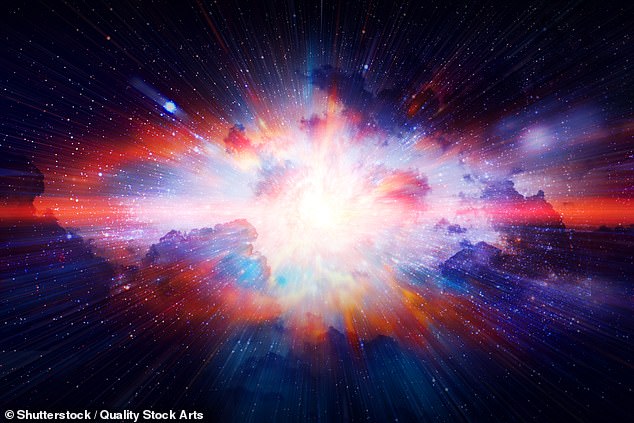Judul : Scientists reveal 'death date' of the universe is sooner than previously believed
link : Scientists reveal 'death date' of the universe is sooner than previously believed
Scientists reveal 'death date' of the universe is sooner than previously believed

The Universe's Clock is Ticking: New Research Suggests a "Big Crunch" Within 20 Billion Years
The lifespan of the universe, a topic of profound cosmological significance, may be finite, according to new research. While the universe has been expanding since the Big Bang, a team of scientists has proposed that this expansion will eventually halt, culminating in a "Big Crunch" – a scenario where all matter collapses back into a single point. This research suggests that the universe is already middle-aged, with roughly 19 billion years remaining before this dramatic conclusion.
This prediction stems from a new cosmic model developed by researchers, which focuses on the behavior of dark energy. Dark energy is a mysterious force believed to be responsible for the accelerating expansion of the universe. While its exact nature remains unknown, scientists theorize it acts as a repulsive force, counteracting the gravitational pull of matter.
Dark Energy: The Key to the Universe's Fate
The new model proposes that dark energy, rather than being a constant force, will weaken over time, eventually succumbing to the relentless pull of gravity. If this weakening occurs as predicted, the combined gravitational force of all the stars, galaxies, and black holes in the universe would ultimately overwhelm the outward pressure, causing the cosmos to contract.
This contrasts with previous theories that suggested the universe might expand indefinitely. The updated model, therefore, presents a significantly shorter timeline for the universe's existence.
Understanding Dark Energy: A Scientific Challenge
Despite its crucial role in the universe's expansion, dark energy remains one of the biggest mysteries in modern cosmology. As one scientist explained, the short answer to the question of what dark energy is, is simply: "We don't know." However, its existence is supported by observations indicating that the universe's expansion is accelerating. Estimates suggest that dark energy accounts for a substantial portion of the universe's total energy density.
The Axion Dark Energy (aDE) Model
In this new study, researchers employed a model known as the axion Dark Energy (aDE) model. This model interprets recent data suggesting that dark energy's behavior might be more dynamic than previously assumed.
Previously, a common assumption was that dark energy was a cosmological constant – a fixed, unchanging energy density driving the universe's expansion at a constant rate. Studies supported this idea, suggesting that dark energy possessed a positive cosmological constant, ensuring continued expansion.
However, the aDE model introduces a different perspective. It proposes that dark energy could possess a negative cosmological constant. This would imply that the universe will eventually reach a maximum size before collapsing in a Big Crunch.
Data Analysis and Predictions
The research team analyzed recent data from the Dark Energy Survey (DES) and the Dark Energy Spectroscopic Instrument (DESI). These projects aim to understand the rate at which the universe is expanding by observing phenomena like exploding stars (supernovae) and the distribution of galaxies.
The data revealed that dark energy's behavior may not be as constant as previous studies suggested. By incorporating a cosmological constant and an ultra-light particle called an axion, the aDE model allowed researchers to estimate key values and predict the universe's future trajectory.
The Role of Axions
The aDE model includes the concept of an axion field. An axion field can be visualized as a pervasive, extremely light energy wave that permeates the universe. By allowing dark energy to be flexible and evolve with the axion field, the model suggests that this repulsive force could have a negative value, implying that it will diminish over time.
Uncertainties and Alternative Theories
It's important to acknowledge that significant uncertainties remain regarding the ultimate fate of the universe. One of the primary challenges is our incomplete understanding of dark energy itself.
Scientists have proposed several theories to explain this enigmatic force:
- Vacuum Energy: This theory connects dark energy to Albert Einstein's cosmological constant, suggesting a constant background energy in space that drives accelerated expansion. However, the predicted strength of vacuum energy doesn't align with current observations.
- Quintessence: This hypothesis suggests that dark energy is a dynamic energy field or fluid that fills space and acts oppositely to normal matter. Its density varies across time and space, leading to the universe's accelerated expansion.
- Cosmic Strings: Another possibility is that dark energy originates from defects in the universe's fabric, such as hypothetical one-dimensional "wrinkles" called cosmic strings, formed in the early universe.
- Modified Gravity: Some researchers propose that dark energy is not a real force but rather a consequence of a flaw in Einstein's theory of gravity. This would imply that the universe's expansion doesn't require the existence of dark energy at all.
These different perspectives highlight the ongoing scientific inquiry into the nature of dark energy and the ultimate fate of the universe. The new research, while offering a compelling scenario, should be viewed as a contribution to this ongoing exploration rather than a definitive answer.
Thus the article Scientists reveal 'death date' of the universe is sooner than previously believed
You are now reading the article Scientists reveal 'death date' of the universe is sooner than previously believed with the link addresshttps://www.unionhotel.us/2025/07/scientists-reveal-death-date-of.html?m=0
0 Response to "Scientists reveal 'death date' of the universe is sooner than previously believed"
Post a Comment